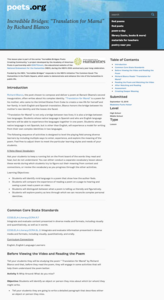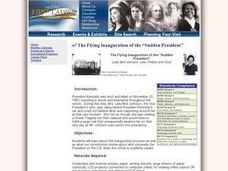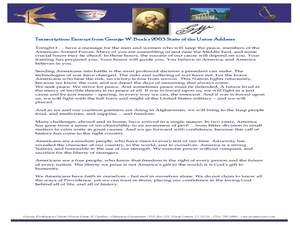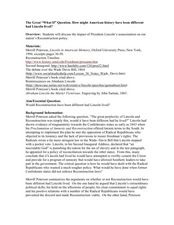John F. Kennedy Presidential Library & Museum
Ask Not What Your Country Can Do for You
Ask not what the lesson here can do for you, but what you can do with the lesson. The answer is quite a lot! Young scholars revisit JFK's famous inaugural address with a focus on his plea for civic engagement. There's a letter to JFK...
Curated OER
I Do Solemnly Swear: Presidential Inaugurations
Students read about the most recent presidential inauguration, and then use primary online resources to answer general and specific questions about U.S. presidential inaugurations.
Curated OER
I Do Solemnly Swear: Presidential Inaugurations
Students examine the process of presidential inauguration. They examine and discuss primary source documents and complete worksheets.
Curated OER
Graph the Presidents At Inauguration- How Old Were They?
Students construct a graph of the presidents' ages at inauguration. In this U.S. history lesson, students use online resources to gather data about the presidents and accurately present their results on a graph.
John F. Kennedy Presidential Library & Museum
Analyzing the Rhetoric of JFK’s Inaugural Address
“And so, my fellow Americans: ask not what your country can do for you—ask what you can do for your. country.” Did you know that John Kenneth Galbraith, Adlai Stevenson, and Theodore Sorensen helped John F. Kennedy craft his 1961...
Curated OER
Woodrow The White House Mouse
Inauguration Day is January 20. Implement an entire week's worth of mini activities to help young historians become knowledgeable of the President's job, the executive branch, and the White House. The worksheets focus on research skills,...
Academy of American Poets
Incredible Bridges: “Translation for Mamá” by Richard Blanco
Who or what do you miss? That's the question that launches an activity that asks writers to craft a paragraph filled with sensory details that shows how they feel. Next, they listen to Richard Blanco reading his poem, "Translation for...
Curated OER
What Does George W. Bush Have in Common With Past U.S. Presidents?
Sixth graders discover what it takes to become President of the United States. Using a database, they complete a scavenger hunt to determine what George W. Bush has in common with past Presidents. They also create a spreadsheet which...
National First Ladies' Library
The Flying Inauguration of the "Sudden President
Students study the inauguration process as well as what the constitution states about who succeeds the President of the US when the office is emergently vacant. They discuss the role of government and the events leading to Lyndon...
Curated OER
Integrity and Firmness is All I Can Promise: The Washington Presidency
Students engage in a lesson which addresses George Washington's leadership as President of the United States. They review a variety of letters written by Washington online, and prepare reports for the class.
Academy of American Poets
Teach This Poem: “In This Place (An American Lyric)” by Amanda Gorman
Amanda Gorman, the United States's first National Youth Poet Laureate, is featured in a resource from the Academy of American Poets. Class members first read Dr. Martin Luther King, Jr.'s "I Have A Dream" speech and note what King wanted...
Curated OER
The Inauguration and the Constitution
Students read the sections of the US Constitution that discuss the elements of the inauguration. They study how the inauguration symbolizes the peaceful transition of power in a democratic republic and show the parts of the inauguration...
Curated OER
George Washington's Foreign Policy
Learners compare George Washington's foreign policy to the policies of presidents who followed him. In this primary source analysis lesson, students compare Washington's Farewell Address to the Roosevelt Corollary, the Monroe Doctrine,...
Curated OER
The Mayflower Compact
Eighth graders investigate historical documents of the United States by reading the Mayflower Compact. In this U.S. History lesson, 8th graders analyze the wording of the original Mayflower Compact of the first U.S. settlers and...
Curated OER
Inaugurating a President
Students study the traditions and history of the U.S. Presidential Inaugurations. They examine the topics George W. Bush talked about in his inaugural address and determine if his remarks clearly outlined what he has done.
Curated OER
The Great "What If" Question. How might American history have been different had Lincoln lived?
Eleventh graders study the Presidency of Abraham Lincoln. In this American History lesson, 11th graders analyze documents related to Reconstruction. Students participate in a debate on Reconstruction.
Curated OER
Does Rick Warren Represent Diversity?
The topic of this instructional activity focuses on whether or not Obama was able to convincingly defend his choice of choosing Rick Warren to deliver the invocation at his inauguration. This is considered a controversial or hot topic...
Curated OER
Rev. Joseph Lowery: What Makes a Civil Rights Leader?
Learners examine the attributes of civil rights leaders. In this Civil Rights Movement lesson, students design "body biographies" of selected civil rights leaders after they have conducted research and discussed the qualities of leaders.
Southern Nevada Regional Professional Development Program
Common Core Reading Standards: Understanding Argument
What does your class know about logical fallacies? They can find out quite a bit and practice identifying logical fallacies if you follow the steps and use the resources provided here! After reviewing ethos, pathos, and logos, ask small...
Curated OER
George Washington & Civic Virtue: The Necessary Elements of the Republic
Students examine the character of George Washington. In this George Washington instructional activity, students read "Rules of Civility and Decent Behavior," Washington's First Inaugural Address, and his Farewell Address. Students use...
National Park Service
How Theodore Roosevelt Became a Leader: Childhood of an American President
The beginning of the 20th century began with a shock: the assassination of President McKinley. The man who would take his place—the youngest American to ever become president—led quite a life before stepping foot in the Oval Office. An...
Curated OER
The Great "What If" Question. How might American history have been different had Lincoln lived?
Young scholars examine the impact of the assassination of President Lincoln. After researching the Republican positions on Reconstruction and analyzing documents related to the Reconstruction, students take a position and explain their...
Curated OER
The Movement of Ideas
Twelfth graders read and analyze the literary elements of Alphonse Daudet's "The Last Lesson" and Abraham Lincoln's Second Inaugural Address. They compare the two works and write an essay describing the reasons they feel the authors...
Curated OER
Lincoln's Political Theology
Students continue to examine the events of the Civil War. Using primary source documents, they identify how Lincoln's religious beliefs affected the decisions he made during this time period. They discuss the meaning of his "Meditation...

























